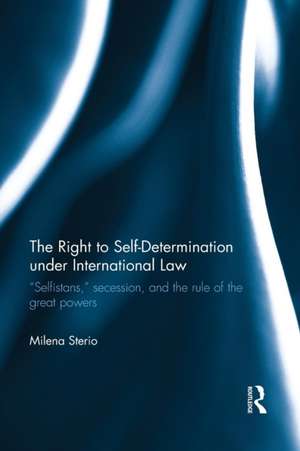The Right to Self-determination Under International Law: “Selfistans,” Secession, and the Rule of the Great Powers: Routledge Research in International Law
Autor Milena Sterioen Limba Engleză Paperback – 12 oct 2015
The Rule of the Great Powers, which asserts that only those self-determination seeking entities which enjoy the support of the majority of the most powerful states (the Great Powers) will ultimately have their rights to self-determination fulfilled. The Great Powers, potent military, economic and political powerhouses such as the United States, China, Russia, Japan, the United Kingdom, France, Germany, and Italy, often dictate self-determination outcomes through their influence in global affairs. Issues of self-determination in the modern world can no longer be effectively resolved through the application of traditional legal rules; rather, resort must be had to novel theories, such as the Rule of the Great Powers.
This book will be of particular interest to academics and students of law, political science and international relations.
| Toate formatele și edițiile | Preț | Express |
|---|---|---|
| Paperback (1) | 410.46 lei 6-8 săpt. | |
| Taylor & Francis – 12 oct 2015 | 410.46 lei 6-8 săpt. | |
| Hardback (1) | 1056.00 lei 6-8 săpt. | |
| Taylor & Francis – 5 noi 2012 | 1056.00 lei 6-8 săpt. |
Din seria Routledge Research in International Law
-
 Preț: 296.42 lei
Preț: 296.42 lei -
 Preț: 311.70 lei
Preț: 311.70 lei -
 Preț: 151.71 lei
Preț: 151.71 lei -
 Preț: 311.94 lei
Preț: 311.94 lei -
 Preț: 281.27 lei
Preț: 281.27 lei - 18%
 Preț: 1053.16 lei
Preț: 1053.16 lei -
 Preț: 484.47 lei
Preț: 484.47 lei -
 Preț: 282.62 lei
Preț: 282.62 lei - 18%
 Preț: 1060.52 lei
Preț: 1060.52 lei - 18%
 Preț: 1058.43 lei
Preț: 1058.43 lei -
 Preț: 452.27 lei
Preț: 452.27 lei - 18%
 Preț: 1054.75 lei
Preț: 1054.75 lei - 18%
 Preț: 727.38 lei
Preț: 727.38 lei -
 Preț: 422.04 lei
Preț: 422.04 lei - 18%
 Preț: 1054.71 lei
Preț: 1054.71 lei - 18%
 Preț: 1059.48 lei
Preț: 1059.48 lei - 18%
 Preț: 1074.44 lei
Preț: 1074.44 lei -
 Preț: 451.41 lei
Preț: 451.41 lei -
 Preț: 419.11 lei
Preț: 419.11 lei - 28%
 Preț: 822.34 lei
Preț: 822.34 lei -
 Preț: 494.07 lei
Preț: 494.07 lei - 18%
 Preț: 1117.88 lei
Preț: 1117.88 lei - 18%
 Preț: 1118.46 lei
Preț: 1118.46 lei -
 Preț: 491.60 lei
Preț: 491.60 lei -
 Preț: 490.25 lei
Preț: 490.25 lei - 18%
 Preț: 1178.15 lei
Preț: 1178.15 lei -
 Preț: 444.62 lei
Preț: 444.62 lei - 18%
 Preț: 1050.78 lei
Preț: 1050.78 lei -
 Preț: 454.22 lei
Preț: 454.22 lei - 14%
 Preț: 301.05 lei
Preț: 301.05 lei -
 Preț: 419.32 lei
Preț: 419.32 lei - 18%
 Preț: 1052.38 lei
Preț: 1052.38 lei - 18%
 Preț: 1111.87 lei
Preț: 1111.87 lei - 18%
 Preț: 1112.34 lei
Preț: 1112.34 lei - 15%
 Preț: 550.99 lei
Preț: 550.99 lei - 18%
 Preț: 1054.71 lei
Preț: 1054.71 lei -
 Preț: 422.91 lei
Preț: 422.91 lei -
 Preț: 286.51 lei
Preț: 286.51 lei - 18%
 Preț: 1065.06 lei
Preț: 1065.06 lei
Preț: 410.46 lei
Nou
Puncte Express: 616
Preț estimativ în valută:
78.54€ • 82.00$ • 65.00£
78.54€ • 82.00$ • 65.00£
Carte tipărită la comandă
Livrare economică 05-19 aprilie
Preluare comenzi: 021 569.72.76
Specificații
ISBN-13: 9781138189836
ISBN-10: 1138189839
Pagini: 224
Dimensiuni: 156 x 234 x 12 mm
Greutate: 0.32 kg
Ediția:1
Editura: Taylor & Francis
Colecția Routledge
Seria Routledge Research in International Law
Locul publicării:Oxford, United Kingdom
ISBN-10: 1138189839
Pagini: 224
Dimensiuni: 156 x 234 x 12 mm
Greutate: 0.32 kg
Ediția:1
Editura: Taylor & Francis
Colecția Routledge
Seria Routledge Research in International Law
Locul publicării:Oxford, United Kingdom
Public țintă
PostgraduateCuprins
Introduction 1. The Notion of Self-determination 2. Recent Applications of Self-determination 3. Self-determination and Other Theories 4. The Great Powers’ Rule or a New Theory of Self-determination 5. International Jurisprudence 6. Case Study 1: East Timor 7. Case Study 2: Kosovo 8. Case Study 3: Chechnya 9. Case Study 4: Georgia (South Ossetia and Abkhazia) 10. Case Study 5: (South Sudan) 11. Conclusion
Descriere
This book considers the issue of self-determination in the present day where some minority groups have asserted their rights to external self-determination, only to find themselves rebuffed by the world community, while other minority groups have found strong support in the eyes of external actors and have garnered sufficient international recognition to be allowed to separate. The book asks what is so unique about some minority groups and about their quests for independence that would justify the authorization to remedially secede? Under what circumstances does the right to external self-determination accrue?
The book draws on international law as well as international relations theory to examine recent international relations issues for practical applications of self-determination quests, as well as by reviewing international legal standards that govern such independence struggles. The book considers particular examples of attempts at self-determination including East Timor, the recent Kosovar secession from Serbia, as well as the Russian province of Chechnya and the two Georgian break-away provinces, South Ossetia and Abkhazia.
The book draws on international law as well as international relations theory to examine recent international relations issues for practical applications of self-determination quests, as well as by reviewing international legal standards that govern such independence struggles. The book considers particular examples of attempts at self-determination including East Timor, the recent Kosovar secession from Serbia, as well as the Russian province of Chechnya and the two Georgian break-away provinces, South Ossetia and Abkhazia.













